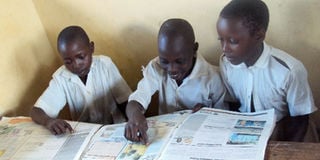Prime
New primary school curriculum expected to make learning easier

Primary Four pupils, like these in Butove PS, this year begin a new curriculum designed to make their studies more beneficial. FILE Photo
National Curriculum Development Centre Coordinator for Upper Primary, Gabriel Obbo Katandi spoke to Education Guide’s Patience Ahimbisibwe about the new primary school curriculum review. Below are excerpts.
What prompted the review of the primary curriculum?
There was an emergency after research findings done by the Ministry of Education, Uganda National Examinations Board and the evaluation department under the National Curriculum Development Centre indicated that children were reaching Primary Seven without knowing how to read and write.
The concern of low literacy and numeracy skills was first raised by parents and education officials. It was also evident in how pupils answered Uneb questions and how they interacted with the community. It doesn’t surprise me if university lecturers complain about their students’ performance.
What are some of the changes?
The review of the lower primary curriculum was done three years ago and is to address the literacy and numeracy weaknesses, the overcrowded curriculum and the promotion of life skills among children.
What has been achieved so far?
We have reduced content in the syllabus and revitalised the methodology of teaching for literacy, numeracy and the promotion of life skills from Primary One to Three. We have also addressed the overcrowded curriculum, which is in some instances an unnecessarily repetition either within the subject or amongst the topics in the different subjects.
Why is Primary Four called a transitional stage?
When we started the changes, some subjects were removed from P1 to P3 and pushed ahead and this necessitated the review of Primary Four.
The review in P4 was to address the gaps but also to bridge the learning from thematic to subject based learning, a transit from learning in local language to English language as a medium of communication.
In P1 to P3, no text books are used. The transitional stage, which started this year, uses text books as learning materials.
When we are moving children from thematic to subject content, we then address learners to seven subjects; English language, Mathematics, Integrated Science, Social Studies, Local language, CAPE with three independent learning areas of Creative Art and Physical Education; Music, Dance and Drama; Physical Education and Creative Art and Technology, Religious Education where there is Christian Religious Education and Islamic Education.
Out of the seven subjects, there are now 10 learning areas but we present them under seven subjects just to reduce the ills which were in the old curriculum.
How do you intend to cope up with the changes?
We are still promoting skills and emphasising learner centered approaches in all subjects and language competences.
But the new thing that has been introduced in P4 is the language competence to take care of the literacy level language competences. We are presenting the learning in the form of content and language.
This time when you are teaching science, you have to address the language competence that children need to get from every topic and it applies to other subjects by identifying the language that can be understood by that particular subject.
There is continuous assessment in this programme and teachers need assistance on how to teach the curriculum and how to assess learners in all the subjects all the time. Teachers need skills to design continuous activity, taking record required for continuous assessment and develop ethical behavior required for the valued continuous assessment.
Parents, who are worried about the new development, should trust teachers for assessment and empower them by increasing their capacity to do that.
How is it that Uganda National Examinations Board isn’t aware of the processes of Primary Leaving Examinations come 2013?
Some people think that thematic approach is not going to be examined. This is a lie. We have completed Primary Four and Five curriculums which follow the same arrangement and have made the draft for primaries Six and Seven. Once we have finalised this, the first step we shall take is to go in consultations with Uneb to plan on how to do PLE. And we shall produce a statement paper to guide Uneb on how to conduct this reviewed curriculum.
When we are consulting Uneb, we are taking the entire process right from thematic to subject-based learning because in setting questions, they will cover what was learnt at thematic, transition and from P5 to P7.



